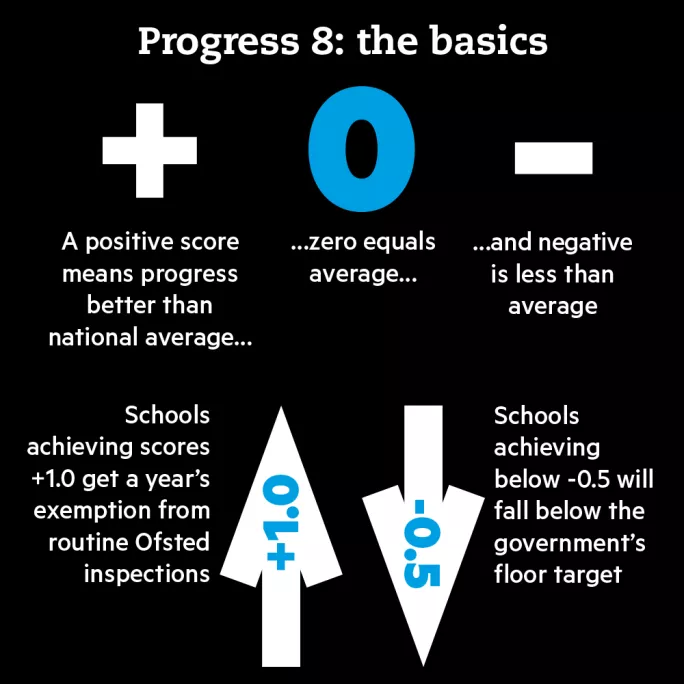Schools ‘could try to get rid of vulnerable pupils’

Schools could try to “lose” their most vulnerable pupils because their GCSE performance could be particularly damaging to league table positions under the government’s new “fairer” Progress 8 measure, heads have warned.
School leaders spoke out in the week that the Department for Education published the first official Progress 8 (P8) scores for England’s secondaries.
The system is designed to be fairer by taking into account the achievements of pupils of all abilities, not just those who achieve the five or more A*-C grade GCSEs needed under the previous headline performance measure.
However, the new measure means that lower-ability pupils can do far more damage to a school’s overall league table position, increasing the risk of them falling below floor standards and being at risk of takeover.
Under the previous system, a teenager’s GCSE results could add percentage points to their school’s score, but not take away from it.
But with P8 - based on average progress across a school - a single pupil’s poor results can cancel out the achievements of many more classmates.
Rebecca Allen, director of Education Datalab, who has shared her new study on the issue exclusively with TES, said: “In the days of five A*-C, all students were equal: each child would contribute a one or a zero to the school’s pass rate.
“For Progress 8, the half a grade positive progress made by 27 students in a form class can get wiped out by three others who, for many reasons, fail to sit any GCSE exams.”

Unfairly judged
Some heads are concerned they could be judged unfairly within their local community and by Ofsted in new league table scores, as a result of extreme circumstances outside of their control. And they fear this could drive others in the same situation to take unethical action.
The warnings came as a snap TES poll found that only 1 per cent of around 1,000 teachers thought that parents understood P8.
Stephen Tierney, chief executive of the Blessed Edward Bamber Catholic MultiAcademy Trust in Blackpool, said that the P8 scores at his schools had dropped because of a few students “whose lives imploded” after extreme home events.
“Some schools may worry about accountability and try to lose [the most vulnerable students],” he told TES.
“From a statistical basis, I can see what the heads are worrying about but it’s just wrong and it means other schools have more issues.”
Secondaries need an overall P8 score of -0.5 or better to avoid dropping below the government’s floor standard.
Liam Collins, headteacher of Uplands Community College in East Sussex, said that his P8 score for pupil-premium children would have risen to -0.08 from -0.53 if one student had been removed this year.
And the fact that the pupil spent Years 10 and 11 in alternative provision did not stop her from influencing the school’s score.
“We tried to do the right thing by not permanently excluding her but then we got hammered later on,” Mr Collins said. “Why is it that just one student causes that much of a headache?”
Mr Collins is worried about what Ofsted and the regional schools commissioner may think about his school because of the anomaly.
‘We don’t want schools looking twice at doing their very best to keep students’
“If they don’t understand the data, then it becomes very difficult,” he said.
Duncan Baldwin, deputy director of policy at the Association of School and College Leaders, said the problem must be addressed urgently to ensure schools were not deterred from taking on vulnerable students.
“We don’t want a situation where schools are potentially looking twice at doing their very best to keep those students in the school because of the impact [on the performance measure],” he said.
Dr Allen’s study found that the schools significantly affected by a few students with extremely low scores were overwhelmingly those with more disadvantaged intakes - as pupils eligible for free school meals are more likely to miss their target grades.
Dr Allen acknowledged that school leaders might feel that the negative effect of outliers on scores was “understandably unjust”.
She suggested that P8 could be limited to ensure no student can fall below -2.5 or rise above +2.5. The academic has calculated that this could prevent 50 schools falling below the floor standard.
Mr Baldwin also wants a limit on how negative a student’s impact can be.
“This is urgent and pressing to make sure that schools are not worried about taking certain students,” he said.
“Progress 8 is a moral measure because it looks at all pupils’ grades at each grade level. But its biggest strength is also its biggest weakness.”
A DfE spokesperson said: “As with any data-based measure, we would encourage those making assessments of school performance to take into account any wider challenges that may impact on performance.
“We are working with the sector to ensure these changes work for everyone.”
For details of how P8 works download our free TES poster
You need a Tes subscription to read this article
Subscribe now to read this article and get other subscriber-only content:
- Unlimited access to all Tes magazine content
- Exclusive subscriber-only stories
- Award-winning email newsletters
Already a subscriber? Log in
You need a subscription to read this article
Subscribe now to read this article and get other subscriber-only content, including:
- Unlimited access to all Tes magazine content
- Exclusive subscriber-only stories
- Award-winning email newsletters